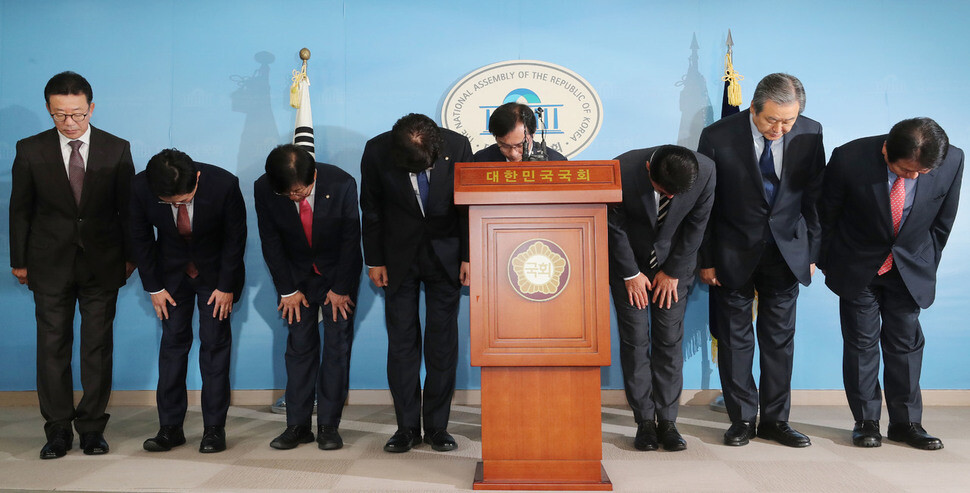hankyoreh
Links to other country sites 다른 나라 사이트 링크
[Editorial] Bareun Party’s disintegration reveals sad state of South Korean conservatism

Kim Moo-sung and nine other members of the Bareun Party announced their en masse defection on Nov. 6 and are scheduled to rejoin the Liberty Korea Party (LKP) around Nov. 9. With this, the splintering of a party that once upheld values of “reforming conservatism” has become a reality. The Bareun Party has lost its status as a parliamentary negotiation bloc (which is reserved for parties with over 20 seats) and is now reduced to being a minor party with just 11 seats in the National Assembly. As a result, its upcoming convention on Nov. 13 has faded in significance. The lawmakers’ return solidifies the LKP’s status as the second largest party, bringing its total up to 116 seats – just a few short of the Minjoo Party’s 121.
The Bareun Party defectors cited “conservative unity” as their reason for leaving. In a statement, they said the conservatives have been forced to “helplessly watch the Moon Jae-in administration enjoy a free hand amid their splintering and indecisiveness.”
“For the sake of the Republic of Korea’s future, conservatives need to transcend conflicts and divisions and become one, regardless of the reason,” they declared.
It’s an utterly farfetched explanation. The same people who talked about the need for “new” and “reformed” conservatism back when they left the LKP in January are now returning just ten months later with talk about “conservative unity.” They’re typical fairweather politicians: focusing on their immediate interests first and making up their justifications as needed.
The defectors have willfully closed their eyes to the reality of conservative parties in South Korea today, as exemplified by the LKP. As their justification, they merely talk about stopping the Moon administration’s “free hand” – without any effort to assess the current state of the LKP, which they described as “pandemonium” when they left in January. The LKP today is the party of Park Geun-hye without the actual Park Geun-hye; nothing much has changed in the last ten months in terms of ideology, policy, or behavior. To return to the party in that condition is basically a surrender to reactionary and regressive conservatism.
How are Kim, Joo Ho-young, Kim Yong-tae, Hwang Young-cheul, Kim Young-woo, and the other lawmakers going to explain their pointless political capitulation to the public after previously leading the push to leave the LKP and create the Bareun Party?
The reason these kinds of opportunistic “migrations” happen so often in South Korean politics is because voters tend to turn a blind eye to such unjustifiable behavior when the elections come. Those voters need to remember the behavior of the politicians who should be taking responsibility for the Park administration’s failures: trampling the tender shoots of “new conservatism” and migrating back wherever their political interests lie.
The lawmakers’ exodus leaves the Bareun Party’s experiment with “conservative reforms” facing a major trial. It’s possible the LKP’s attractive force could jeopardize the party’s very survival. The Bareun Party’s splintering offers a sad illustration of just how barren the political soil of South Korean conservatism is.
Please direct questions or comments to [english@hani.co.kr]

Editorial・opinion
![[Editorial] Does Yoon think the Korean public is wrong? [Editorial] Does Yoon think the Korean public is wrong?](https://flexible.img.hani.co.kr/flexible/normal/500/300/imgdb/original/2024/0417/8517133419684774.jpg) [Editorial] Does Yoon think the Korean public is wrong?
[Editorial] Does Yoon think the Korean public is wrong?![[Editorial] As it bolsters its alliance with US, Japan must be accountable for past [Editorial] As it bolsters its alliance with US, Japan must be accountable for past](https://flexible.img.hani.co.kr/flexible/normal/500/300/imgdb/original/2024/0417/6817133413968321.jpg) [Editorial] As it bolsters its alliance with US, Japan must be accountable for past
[Editorial] As it bolsters its alliance with US, Japan must be accountable for past- [Guest essay] Amending the Constitution is Yoon’s key to leaving office in public’s good graces
- [Editorial] 10 years on, lessons of Sewol tragedy must never be forgotten
- [Column] A death blow to Korea’s prosecutor politics
- [Correspondent’s column] The US and the end of Japanese pacifism
- [Guest essay] How Korea turned its trainee doctors into monsters
- [Guest essay] As someone who helped forge Seoul-Moscow ties, their status today troubles me
- [Editorial] Koreans sent a loud and clear message to Yoon
- [Column] In Korea’s midterm elections, it’s time for accountability
Most viewed articles
- 1Samsung barricades office as unionized workers strike for better conditions
- 2[Column] The clock is ticking for Korea’s first lady
- 3[Editorial] When the choice is kids or career, Korea will never overcome birth rate woes
- 4Why Israel isn’t hitting Iran with immediate retaliation
- 5[News analysis] After elections, prosecutorial reform will likely make legislative agenda
- 6S. Korea, Japan reaffirm commitment to strengthening trilateral ties with US
- 7Japan officially says compensation of Korean forced laborers isn’t its responsibility
- 8[Editorial] As it bolsters its alliance with US, Japan must be accountable for past
- 9[Editorial] Does Yoon think the Korean public is wrong?
- 10[Guest essay] How Korea turned its trainee doctors into monsters